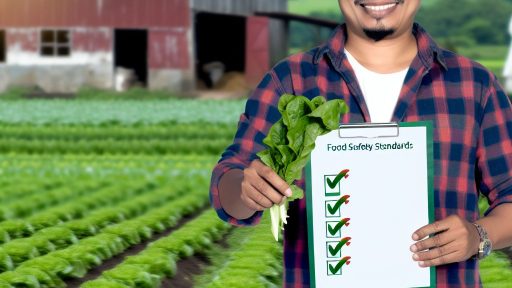Introduction to Export Regulations for Farmers
Export regulations are essential for farmers engaging in global trade.
Understanding these regulations can open new market opportunities.
Farmers must navigate complex legal frameworks and compliance requirements.
Each country has specific regulations governing agricultural exports.
Familiarizing yourself with these rules helps prevent costly mistakes.
The Importance of Compliance
Compliance with export regulations protects your business interests.
Non-compliance can lead to fines or even bans on exports.
Regulations ensure that products meet safety and quality standards.
This not only protects consumers but also enhances your reputation.
Key Regulations to Consider
Different types of regulations impact agricultural exports.
- Sanitary and Phytosanitary Standards (SPS)
- Hazard Analysis Critical Control Point (HACCP)
- Labeling and packaging requirements
Each regulation aims to ensure product quality and safety.
Documentation and Permits
Accurate documentation is crucial for successful exports.
Farmers need various permits depending on the destination country.
Common documents include export licenses and phytosanitary certificates.
Ensuring all paperwork is in order can streamline the export process.
Transform Your Agribusiness
Unlock your farm's potential with expert advice tailored to your needs. Get actionable steps that drive real results.
Get StartedStaying Updated on Regulations
Export regulations can change frequently, impacting trade practices.
Farmers should stay informed through industry news and government websites.
Joining trade organizations can provide valuable resources and updates.
Networking with experienced exporters offers practical insights.
Understanding Export Regulations for Sustainable Business
In summary, understanding export regulations is vital for farmers.
This knowledge facilitates access to international markets.
By complying with regulations, farmers can build a sustainable export business.
Understanding the Importance of Compliance in Global Trade
The Role of Compliance
Compliance is crucial for farmers engaged in global trade.
It ensures that products meet international standards.
Failure to comply can lead to significant financial losses.
Moreover, non-compliance can result in legal penalties.
Building Trust with International Partners
Compliance helps build trust with global partners.
When farmers follow regulations, credibility increases.
Trustworthy relationships foster long-term partnerships.
Subsequently, this can lead to more business opportunities.
Protecting Brands and Products
Adhering to export regulations protects a brand’s reputation.
A compliant brand is likely to face fewer complaints.
This leads to customer satisfaction and loyalty.
Additionally, it mitigates the risk of product recalls.
Accessing New Markets
Compliance opens doors to new global markets.
Many markets have stringent regulations in place.
Good compliance practices enhance market entry chances.
This expands sales potential significantly.
Adapting to Regulatory Changes
Regulations in global trade frequently change.
Showcase Your Farming Business
Publish your professional farming services profile on our blog for a one-time fee of $200 and reach a dedicated audience of farmers and agribusiness owners.
Publish Your ProfileFarmers must stay informed about these changes.
Adapting quickly can prevent costly delays.
Furthermore, it allows farmers to maintain competitiveness.
Importance of Compliance for Farmers
In summary, compliance is essential in global trade.
It protects farmers’ interests and enhances opportunities.
Ultimately, understanding and adhering to regulations is vital.
Key Regulations Affecting Agricultural Exports
Understanding Export Regulations
Export regulations shape how farmers conduct international business.
These rules vary by country and commodity.
Compliance is crucial for successful global trade.
International Trade Agreements
Trade agreements set the stage for agricultural exchanges.
They establish tariffs, quotas, and trade barriers.
Farmers should familiarize themselves with agreements like NAFTA.
Organizations like the WTO encourage fair trade practices.
Additionally, these agreements promote agricultural exports and imports.
Documentation and Compliance
Proper documentation ensures smooth export processes.
Farmers must submit export licenses, health certificates, and phytosanitary documents.
Compliance with these requirements prevents delays and fines.
State and federal agencies provide resources for necessary paperwork.
Food Safety Regulations
Food safety regulations protect consumers and farmers alike.
Regulations differ based on the destination country.
Many countries require adherence to specific safety standards.
Farmers should stay updated on regulations from agencies like the FDA.
Labeling Requirements
Accurate labeling is vital for successful exports.
Labels must comply with the destination country’s laws.
This includes ingredient lists, nutritional information, and allergens.
Farmers should understand these requirements before shipping products.
Environmental Impact Regulations
Environmental policies influence export capabilities.
Farmers must comply with sustainability and conservation initiatives.
Compliance can impact market access in certain regions.
Understanding local and international environmental regulations is key.
Investigating Market-Specific Regulations
Different markets have unique regulations for imports.
Farmers should research requirements specific to each country.
Consulting trade experts can provide valuable insights.
Each market may have particular standards for organic or non-GMO products.
Learn More: Adapting Farms to Comply with Climate Policies
Documentation Required for Exporting Agricultural Products
Importance of Proper Documentation
Proper documentation is crucial for agricultural exports.
It ensures compliance with international regulations.
Additionally, it helps in smooth customs clearance.
Common Export Documents
Several documents are commonly required for exporting agri-products.
- The commercial invoice outlines the transaction details.
- The packing list provides information on the contents of the shipment.
- The bill of lading serves as a contract between the shipper and carrier.
- Certificates of origin verify where the goods are manufactured.
- Health certificates affirm that products meet safety standards.
Special Certifications
Certain products may require special certifications.
Showcase Your Farming Business
Publish your professional farming services profile on our blog for a one-time fee of $200 and reach a dedicated audience of farmers and agribusiness owners.
Publish Your ProfileFor organic produce, an organic certification is essential.
Moreover, specific countries may request additional documentation.
It is essential to research the importing country’s regulations.
Electronic Documentation
Electronic documentation has become increasingly common.
Many customs authorities accept electronic submissions.
This format can expedite the shipping process.
Moreover, it reduces the risk of paperwork errors.
Consulting with Experts
Consulting export specialists can provide valuable insights.
They can guide you on the specifics of required documentation.
Staying informed can save time and cost.
Consider hiring a freight forwarder for assistance.
Learn More: Food Safety Standards and Their Impact on Agricultural Markets
The Role of Export Licenses and Permits
Importance of Export Licenses
Export licenses are crucial for international trade compliance.
They ensure that farmers adhere to government regulations.
Licenses often prevent the unauthorized export of sensitive goods.
Furthermore, they protect national security and economic interests.
Types of Export Licenses
Different types of export licenses exist based on commodities.
- General licenses apply to most agricultural products.
- Specific licenses are for restricted or controlled items.
- Site licenses allow multiple exporters to use a single license.
Obtaining an Export License
The process for obtaining an export license can vary.
First, farmers must identify the appropriate licensing authority.
Next, they should complete the application accurately and thoroughly.
Clearing customs frequently requires additional documentation.
Finally, farmers must ensure they comply with all conditions set forth.
Permits vs. Licenses
Export permits serve a different purpose than licenses.
Permits are often required for specific shipments or goods.
They may impose additional restrictions or conditions.
Farmers must assess whether they need one or both for their products.
Consequences of Non-Compliance
Failure to obtain necessary licenses or permits can lead to penalties.
Farmers might face fines or legal action for violations.
Additionally, non-compliance can lead to shipment delays.
This can damage relationships with international buyers.
Ultimately, compliance fosters trust and credibility in global trade.
Discover More: Agricultural Insurance Policy Claims: A Step-by-Step Guide
Country-Specific Export Regulations: A Comparative Analysis
Understanding Export Regulations
Export regulations vary widely by country.
Each nation has unique requirements and compliance standards.
Understanding these regulations is crucial for farmers.
Non-compliance can lead to penalties and lost opportunities.
Key Elements of Export Regulations
Several factors contribute to export regulations.
- Certification and documentation requirements.
- Quotas and import tariffs influencing trade.
- Quality standards affecting product eligibility.
Farmers must familiarize themselves with these elements.
Country-Specific Considerations
Different countries have distinct compliance measures.
For instance, the United States emphasizes food safety standards.
Showcase Your Farming Business
Publish your professional farming services profile on our blog for a one-time fee of $200 and reach a dedicated audience of farmers and agribusiness owners.
Publish Your ProfileMeanwhile, the European Union has stringent labeling requirements.
In Canada, producers must consider trade agreements.
Export Regulations in the United States
The U.S. government mandates specific certifications for exports.
Farmers must adhere to the USDA guidelines for food exports.
Additionally, compliance with the FDA is essential for certain products.
Export Regulations in the European Union
The EU has rigorous standards for agricultural exports.
Farmers must ensure compliance with the Common Agricultural Policy.
Labeling standards within the EU are also strict and detailed.
Export Regulations in Canada
Canada focuses on both domestic and international compliance.
Farmers must navigate multiple regulatory bodies.
Trade agreements with the U.S. and Mexico influence Canadian policies.
Impacts of Non-Compliance
Failure to meet export regulations can have serious repercussions.
Farmers risk facing fines, product recalls, or bans.
It can also damage their reputation in international markets.
Staying Informed on Regulatory Changes
Export regulations continuously evolve in response to global dynamics.
Farmers must stay updated on these changes for compliance.
Setting up alerts for regulatory updates can be beneficial.
See Related Content: How to Choose the Right Farm Insurance Policy

Health and Safety Standards in Agricultural Exports
Importance of Health and Safety Standards
Health and safety standards are vital in agricultural exports.
They ensure the protection of public health and the environment.
Additionally, these standards promote fair trade practices worldwide.
International Regulations
Various international regulations govern agricultural exports.
The Codex Alimentarius Commission sets food safety standards globally.
Countries may also adhere to specific guidelines from the World Trade Organization.
Compliance with these regulations builds consumer trust.
National Regulations
Each country may have its own specific health regulations.
The United States Department of Agriculture oversees food safety in the U.S.
Similarly, the European Union enforces strict regulations for member states.
Farmers must stay informed about local regulations before exporting.
Export Documentation Requirements
Proper documentation is essential when exporting agricultural products.
Certificates of analysis verify product compliance with safety standards.
Health certificates are often required to ensure product safety.
Additionally, other documents may include phytosanitary certificates.
Maintaining Records
Farmers should maintain detailed records of their exports.
This includes tracking product origin and handling procedures.
Accurate records facilitate smooth communication with regulatory agencies.
Adhering to Food Safety Practices
Implementing rigorous food safety practices is crucial.
Farmers must ensure their products are free from contaminants.
Regular testing and monitoring of crops can help in this regard.
Training staff on food safety standards also leads to better compliance.
Showcase Your Farming Business
Publish your professional farming services profile on our blog for a one-time fee of $200 and reach a dedicated audience of farmers and agribusiness owners.
Publish Your ProfileBest Practices for Farmers
- Adopt Good Agricultural Practices (GAP).
- Utilize proper storage and transport methods.
- Maintain cleanliness in farming operations.
Consequences of Non-Compliance
Failure to comply with health and safety standards can have serious repercussions.
Non-compliance may lead to product recalls and financial losses.
Furthermore, it can damage a farm’s reputation in the marketplace.
Legal penalties may also arise from insufficient adherence to regulations.
Best Practices for Farmers to Ensure Compliance with Export Regulations
Understanding Export Requirements
Export regulations vary by country and product type.
Farmers must research the specific requirements for their products.
It is essential to stay informed about changing regulations.
Consulting government websites can provide valuable information.
Documenting Your Products
Accurate documentation is crucial for successful exports.
Farmers should maintain records of all their products and shipments.
Invoices, packing lists, and certificates are necessary for compliance.
Implementing a reliable record-keeping system will help facilitate audits.
Quality Control Measures
Ensuring product quality is vital for meeting export standards.
Farmers should conduct regular quality inspections before shipment.
Implementing Good Agricultural Practices (GAP) can enhance product quality.
Moreover, third-party certifications can provide additional assurance.
Engaging with Export Consultants
Obtaining expert advice can streamline the export process.
Export consultants can help identify compliance requirements.
They can also guide farmers in navigating international trade regulations.
Utilizing this expertise can prevent costly mistakes.
Staying Informed About Trade Agreements
Trade agreements can impact export opportunities significantly.
Farmers should remain aware of relevant agreements involving their products.
Understanding tariffs, quotas, and trade barriers is essential.
Monitoring changes in trade policies will help adjust strategies accordingly.
Building Relationships with Importers
Fostering strong relationships with international buyers is beneficial.
Regular communication can enhance trust and reliability.
Understanding the needs of partners can lead to more successful transactions.
Also, being responsive to inquiries will strengthen these relationships.
Consequences of Non-Compliance
Legal Implications
Non-compliance with export regulations can lead to serious legal consequences.
Farmers may face lawsuits from trade partners who suffer losses.
Additionally, regulatory agencies can impose penalties for violations.
In some cases, violations may result in criminal charges against individuals.
Legal battles can be lengthy and costly, harming farm operations.
Financial Implications
Financial losses can accumulate quickly due to non-compliance.
Fines and penalties often cause immediate cash flow issues.
Furthermore, businesses may lose access to key markets, affecting revenue.
Insurance premiums might rise due to perceived risks in compliance failures.
Ultimately, the financial toll can jeopardize long-term sustainability.
Reputational Damage
Non-compliance can severely damage a farmer’s reputation.
Negative publicity can deter potential customers and partners.
Showcase Your Farming Business
Publish your professional farming services profile on our blog for a one-time fee of $200 and reach a dedicated audience of farmers and agribusiness owners.
Publish Your ProfileRestoring reputation requires significant effort and resources.
Building trust within the agricultural community is also crucial.
Long-term relationships may suffer as a result of compliance issues.
Operational Disruptions
Compliance failures can disrupt normal farm operations.
Increased scrutiny from authorities often follows violations.
Farmers may need to allocate resources to address compliance issues.
This diversion of resources can limit growth and innovation.
Operational inefficiency can further exacerbate financial strain.




